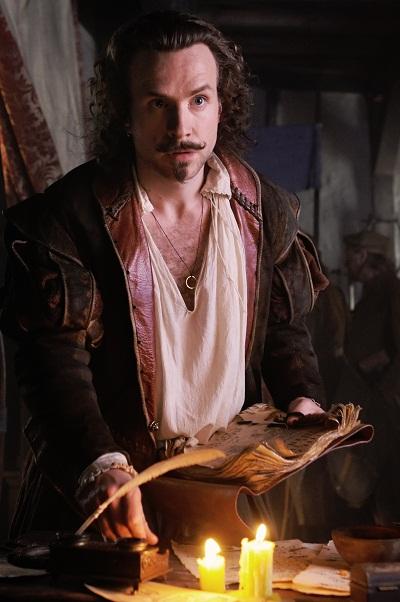
Rafe Spall as William Shakespeare in "Anonymous," looking as shocked as I was in the movie theatre.
And now for the surprise of the century: I paid eleven dollars and fifty cents this past Saturday to see Roland Emmerich’s new film “Anonymous,” the film about how the-artist-possibly-known-as William Shakespeare was anything but. I know, I know, shocking. I’ve been waiting for it to hit the silver screen for about half a year. It is, admittedly, an actor-nerd fantasy of mine brought to life: a film about the man to whom I’ve given my work and life. And pretty period costumes. And prettier Englishmen. In other words, serious, serious business. And being the serious eminent Shakespearean that I fancy myself to be, I feel it’s my duty to edify you readers on the film and the “Oxfordian theory of authorship” that it purports. You can read more about the theory itself HERE and HERE, WHICH YOU DEFINITELY SHOULD, but I’ll give you a quick primer: Stratfordians believe that William Shakespeare, whoever he was, wrote everything that bears his name – plays, sonnets, etc. Oxfordians believe that Edward de Vere, the 17th Earl of Oxford, landed aristocrat, courtier and itellectual, wrote the plays in stead.
Let us dispense with the niceties and get straight to the heart of the matter, shall we? Because the film is sh*t. Really, though! I realize that’s my opinion, and that that’s rather harsh, but I have a feeling it’s no skin off of Roland Emmerich’s back. That being said, it gets my vote for the Best Worst Movie of 2011. “Anonymous,” with it’s pouty Edward de Vere and caddish Shakespeare and passive agressive and closeted Kit Marlowe (he isn’t the only character in the film that gives off those vibes, believe me), is so bad it’s almost good. In fact, it’s one big sexually repressed Elizabethan stereotype! Which is…nice?
To be honest, the cast should be applauded for their remarkable efforts to try and make Emmerich and John Orloff’s script better than it is. The script is, to be frank, awful, and the worst thing (among many, many, many bad things) about the film. It’s laughable at it’s most enjoyable – and that’s not because you’re laughing WITH it, that’s for sure. But again, the cast makes a Herculean effort with what they’ve been given, and it shows. Most enchanting is the Bard himself, played by Rafe Spall, who in his performance has embraced all the vitriol of the Anti-Stratfordian theorists and turned his Shakespeare into just the man they’ve always wanted him to be: a complete and total asshole.
So it’s not to say that the film isn’t fun. But that very well may be the problem with it: the reaction of playfulness it induces in its audience. Because it’s clear that the film takes itself terribly seriously, just as the current supporters of the Oxfordian theory take their beliefs in the former Earl of Oxford himself. The fact that the script is a mess ruins any hope that Oxfordians have of convincing people of their argument. For those who would debate my calling the film a serious representation of the theory, I call their attention to Mark Rylance and Sir Derek Jacobi – intellectual and legendary heavyweights of the classical theatre, actors in “Anonymous,” and boisterous supporters of the Oxfordian theory. Both have gone on record in recent years as anti-Stratfordians, and have even gone so far as to sign the “Declaration of Reasonable Doubt About the Identity of William Shakespeare,” which is exactly what it sounds like it is. Why would the two of them involve themselves with this film – a film with a script that ANYONE could read and be confident in its atrocity – if they were not gravely serious in their support of its message? Answer: they wouldn’t.
So unfortunately for Oxfordians like themselves, “Anonymous” does nothing but make their claims seem more ridiculous than ever before. As for myself, I can’t say whether or not I support or refute their claims. To put it plainly, I will never care as much as they do about who wrote the Bard’s words. I will always, always care more about the words themselves.

One Comment
lehuggin posted on October 31, 2011 at 7:16 pm
I saw this movie with Olivia, and I wanted to add a little anecdote from a NY Times Film review of “Anonymous” that I think sums it up pretty nicely: “Anonymous is a vulgar prank on the English literary tradition, a travesty of British history and a brutal insult to the human imagination. Apart from that, it’s not bad.” – A. O. Scott. Yes, the script is horrible, I would love to tackle the task of re-writing the script, since the plot as a whole is not actually a bad story. I might have enjoyed the movie if there had been a disclaimer at the beginning that the work was purely fictional. The fact that the film took itself seriously was probably it’s worst fault, sadly.